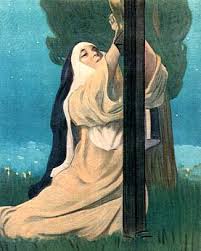Suor Angelica

by Giacomo Puccini
“Yes, death is more beautiful than life!”
Written late in Puccini’s brilliant career, Suor Angelica is the second one-act opera of his masterful triptych, Il Trittico. Sister Angelica is one of the great lyric soprano roles, climaxing in the heart-rending aria, “Senza mamma”. You will be moved as never before by this touching English performing translation.
Excerpt:
Sister Angelica: “Senza mamma”
"Oh, my baby, you died without me. If only I'd been there to hold you; kiss your lips as they grew colder; close your beautiful eyes forever. Little hands across your chest, no more able to reach out and touch me! For you are gone now, never having known how much I loved you, how much I loved you!
But, you‘re in Heaven, a blessed little angel. You can look down and see me, see your mother. You can come from above and be here near me. Oh, please come now! Let me hear you. Let me see you. You're here. You're here. I feel your tiny hands on my face! Oh, tell me, when can I be with you in Paradise? When can we be together? Ah, sweet end to all my years of suffering: that day I can greet you in Heaven. Say when shall death release me and take me to you?"
Oh, won’t you tell me, dearest child, so precious? Just give an answer with the twinkle of a star. Answer me, answer me, my darling, my darling, my love!"
Copyright Kenneth Jakobs 2013
All rights reserved
Notes
Sister Angelica has waited in a convent for seven long years with no word from her family. And every day her thoughts have been of her son, her long-lost child, her beautiful baby, who was torn from her arms after she was allowed to hold and kiss him just once. Her wealthy, noble family forced her to become a nun for the crime of tarnishing their reputation by giving birth out of wedlock.
On the day on which the opera takes place, Angelica’s Aunt, the Princess, arrives. But she has only come to secure Angelica’s signature on documents pertaining to the marriage of her younger sister. When Angelica demands news of her son she is coldly informed that two years previously he became ill, and died.
Angelica is devastated. After the Princess leaves, she sings the exquisite aria printed above, in which she imagines her child dying alone, without his mother. She then sees him as an angel in heaven, able to come down and visit her. She feels his presence and asks him when she can die and join him in heaven.
She resolves to take her own life to hasten their reunion, and brews and drinks a poisonous tea. As her life is ebbing she realizes that she has committed a sin so grave that she will not be allowed to be with her little boy in Heaven. Distraught, she desperately begs intercession from the Madonna. As she dies she hears a choir of angels singing that her prayers have been answered, and sees a vision of her son walking towards her with outstretched arms.
In our present cynical and mostly secular culture, some reject this opera as overly sentimental and melodramatic. But who can resist its glorious vocal and orchestral music? What can compare to Puccini at the peak of his powers? It never fails to move me, and I believe you will feel Angelica’s anguish, despair, and ultimate joy when seeing this powerful English performing version staged.
